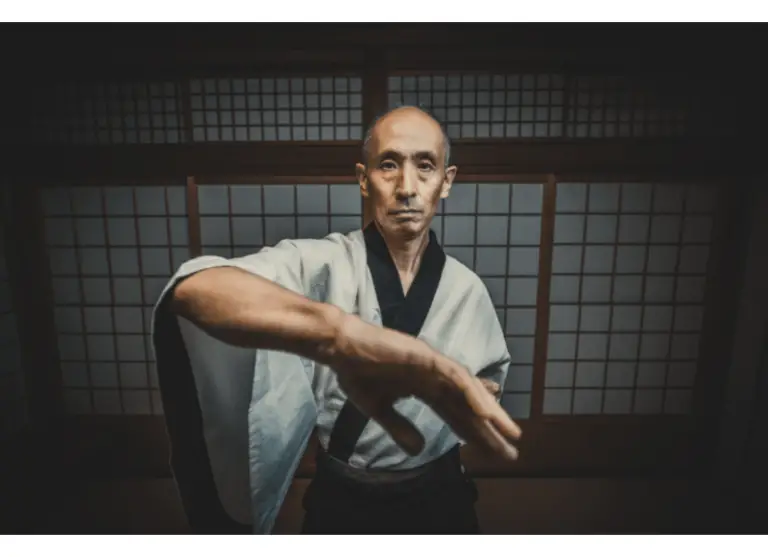How To Journal For Self Improvement
Introduction
When you think of journaling, you might think of some schoolgirl sitting in her room drawing a puppy and writing about ice cream and what she wants to be when she grows up.
But don’t be fooled.
In the right hands, a journal can be a seriously powerful tool for developing yourself. Destroying your goals, and achieving all those things you dream about at night.
But how can we achieve these ends? What mistakes do people make when journaling, and what can we do to make sure that our efforts bear fruit?
I’ve researched this topic extensively, in order to answer this question as helpfully as possible.
Let’s get on with it.
Why Journaling can be a powerful tool for self improvement
Because everyone’s journaling process is individual to them, it’s not easy to give a concise answer as to what the benefits of journaling are.
For some, a journal is a place where tasks are set and goals are tracked. For these people their journal is a way of keeping themselves accountable with respect to achieving their ambitions.
For others, journals are full of affirmations, expression of feeling, ideas that strike during their day- the list goes on and on. Journals like these are great tools for positivity and boosting confidence, as well as releasing negative feelings.
Hopefully, you can start to see that journaling isn’t limited to just one benefit. It is a multipurpose self improvement tool that can really serve you if you consistently practice it.
Read also: the 12 characteristics of a virtuous person
What the science says about the power of journaling

In researching for this article, I came across this brilliant study which demonstrates the power of journaling for self improvement.
The study looked at the effect that Journaling had on the quality of life of registered nurses.
The quality of life of the nurses was measured using a survey which assessed their levels of compassion satisfaction, burnout, and trauma/compassion fatigue.
66 nurses took part in the study, with journaling positively impacting all 3 components of their measured life qualities in a statistically significant way.
Studies like this one can get overly scientific and use all kinds of research jargon, but here’s the bottom line:
Science shows that journaling works.
3 Reasons why people get stuck with journaling

If journaling has been shown to be so effective, why is it that so few of us do it consistently?
Let’s take a look at 3 of the main reasons why people fail when it comes to journaling.
They don’t push past the initial mental blocks
It can feel like any time we sit down to focus our mind on something, the whole world starts conspiring against us.
I know you know what I’m talking about!
Steven Pressfield describes this feeling brilliantly in his book the war of art. Any time you want to pursue something ambitious or meaningful, there is a powerful internal resistance that will immediately throw you off track if you’re not careful.
“Resistance will tell you anything to keep you from doing your work. If you take resistance at its word, you deserve everything you get…resistance is always lying and always full of sh*t”
It might seem a little over the top to wage figurative war against this internal opposition to making positive changes in your life,
but that desire for comfort and security can ruin you.
Overcoming mental blocks is a war that you must keep fighting right the way through your life.
Read also: 9 people who stood up for what they believed in!
They consider the short term costs over the long term gains
Check out Jeff Bezos talking about long term thinking:
The thing about positive habits like journaling, meditation and exercise, is that the real benefits accumulate over the long term.
In the moment, you don’t see these rewards. All you see are the thousand other things that you’d rather be doing than sitting down and writing in your journal.
This isn’t really a point about journaling, but about building anything meaningful in your life.
Saving and investing money.
Planning your family’s future.
Getting an education and building a great career.
Starting a business.
All of these endeavors are hard and draining in the early days, and deeply meaningful over the long term. If you can shift your focus from the short term costs to the long term rewards, then you get to really build a life that excites you.
They don’t think practically about their journaling process
When you start out with self development practices like journaling, you want to make the process as easy as possible so that you don’t feel compelled to give up so often.
If you’ve never journaled every day before, or you have failed at being consistent in the past, 1 hour of meditation, journaling and physical stretching sounds like a good idea.
The reality is, going from 0 to committing to so much work every morning is a serious jump to make.
I’m not saying you’ll quit, but I wouldn’t be surprised.
So how should you go about it? How can you set up your daily routine, to give yourself the best possible chance of success?
Check out this practical guide that will point you in the right direction…
A practical guide on making journaling work for you

Hopefully by now you’re convinced that journaling can massively impact your personal development. But how do you actually get started? Let’s talk about what you can write about, when to write, and making your process as easy as possible.
What to write about when journaling
What you will write about will largely depend on what you are like as a person.
Highly practical, results oriented individuals often write to-do lists in their jornal, as well as longer term plans and quotes that they come across which motivate them.
It is also common to write down your long term vision for yourself- let your ambitious mind run and write down where it takes you!
Similarly, great men like Leonardo da Vinci and Albert Einstein wrote extensively in their journals about problems they were trying to solve, as well as ideas that gripped them.
For more emotionally expressive people, a journal can be a place to write down their emotions and how they are feeling about certain things in their life.
Positive affirmations and things you are grateful for are also common topics in self development journals- mine is full of them!
The key here is that there is no correct way.Journaling should serve you.
So if you feel compelled to write something down, go for it!
What time of day is best for journaling

There are three main approaches that people take with their journaling practice.
The first is to write first thing in the morning, potentially as part of a morning routine. To-do lists make a lot of sense in this case, seeing as you’ve got your whole day ahead of you. This is my own favorite approach.
The second is to write at the end of the day, either as you are winding down from work or right before you go to sleep. These journals can be more reflective, whereby you write about the things that happened to you during your day.
Finally, some people keep pocket journals. This is great for capturing moments of inspiration- If you are on the train and you suddenly get an idea for a business, you can write it down in detail before the moment passes and you forget all about it.
Make your journaling process as easy and enjoyable as possible
The trick with finding long term success with journaling, is understanding that it is supposed to be freeing and positive. That being said, anything that you can do to make the whole process less stressful and something to look forward to will pay off significantly.
For me, I achieve this by being incredibly flexible with my journaling. Whilst I am serious about achieving my goals, I allow myself the choice of whether or not to journal in the morning.
Running late for something?
No time to journal and workout?
Something urgent comes up that gets in the way of journaling?
Don’t be hard on yourself for missing a couple of days here and there. That way, journaling can remain something that you want to do, rather than something that you have to do.
This is just my opinion of course, but It has served me well.
Pictures from my own Journal!
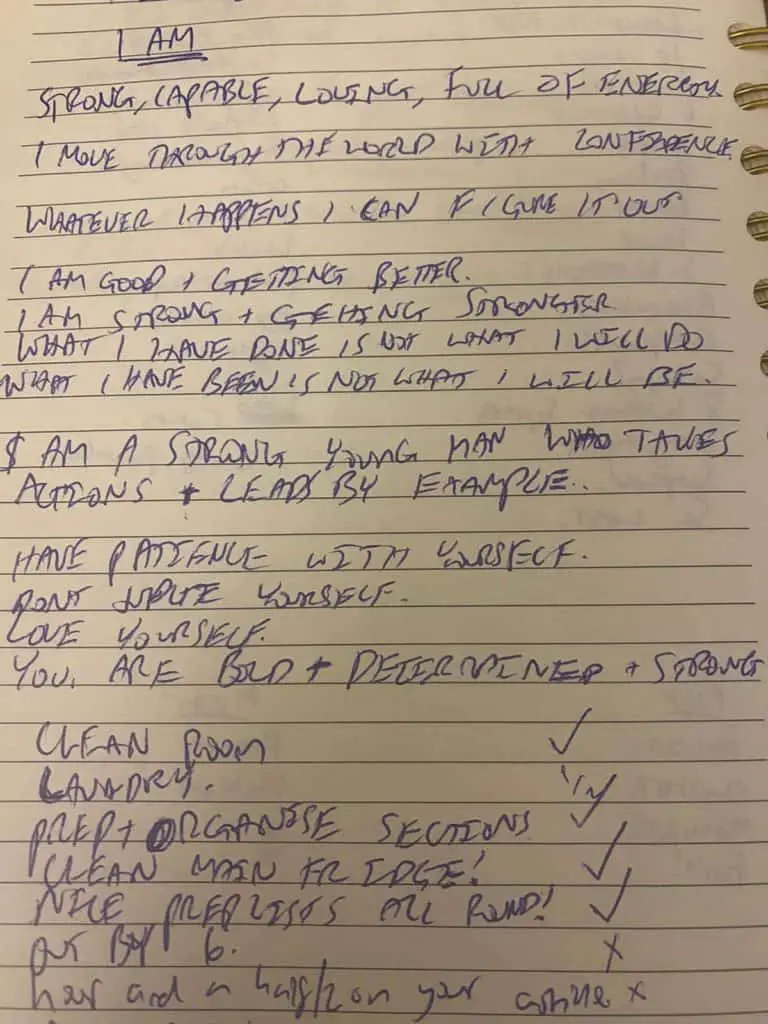
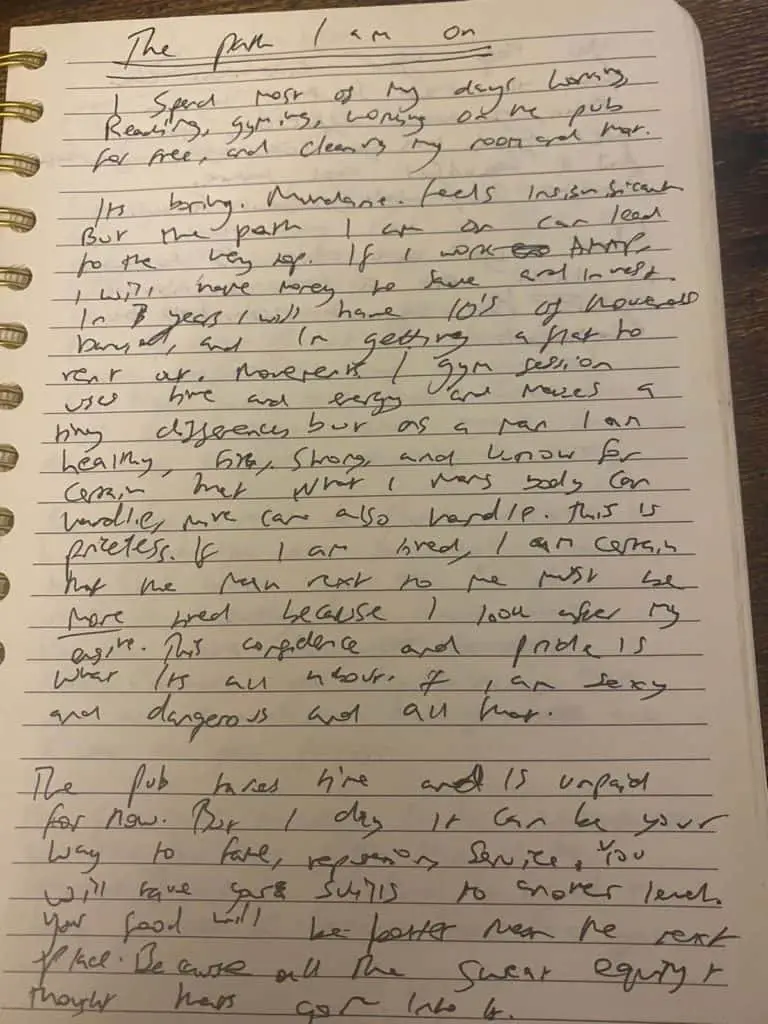
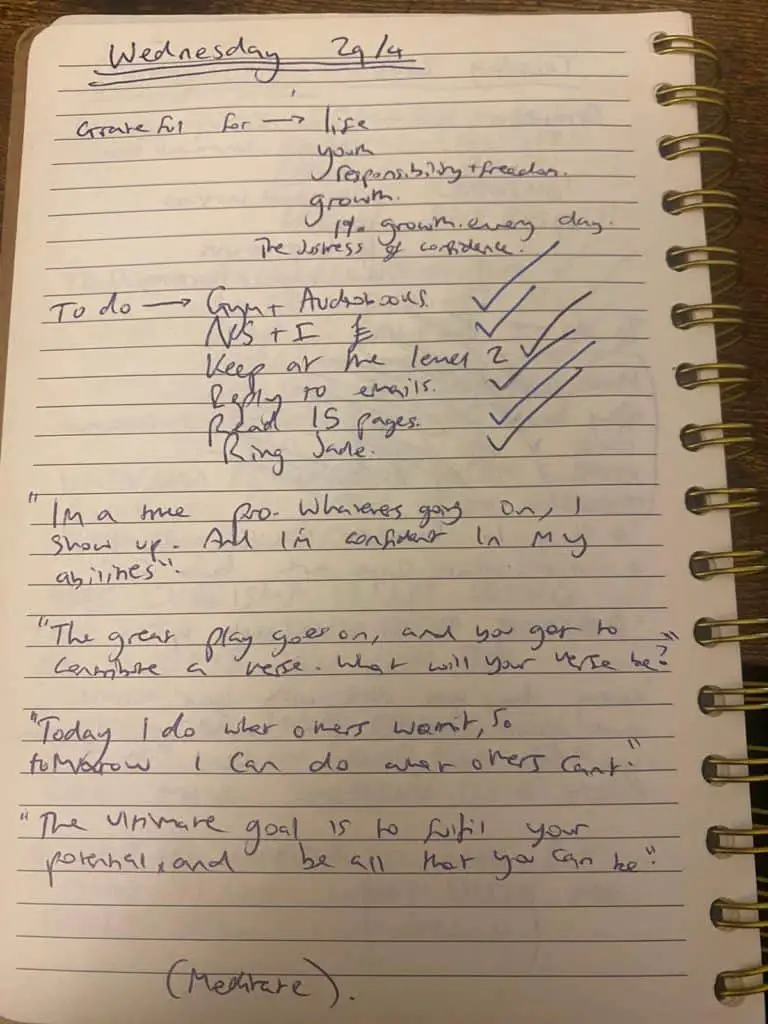
3 of the greatest who used journaling to make an impact
Leonardo da Vinci
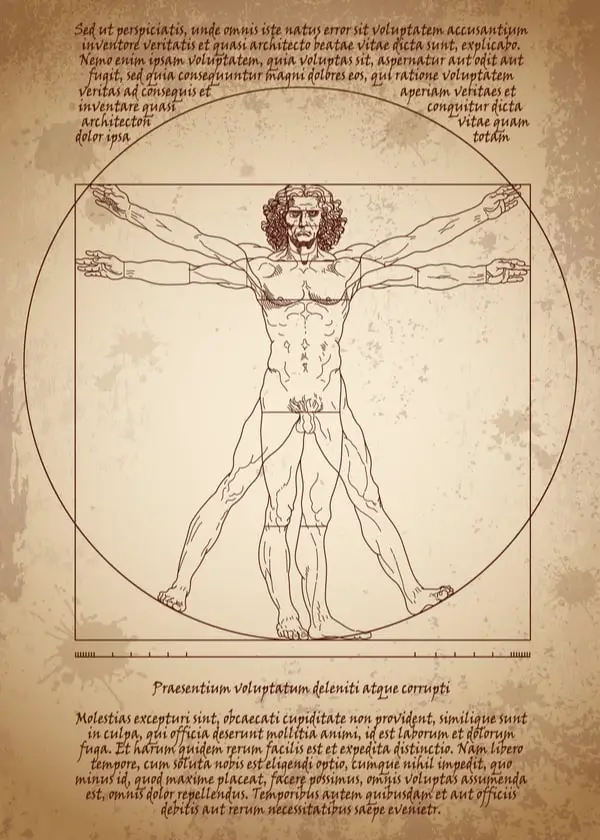
Leonardo da Vinci is the face of the renaissance: during his life he made significant contributions to architecture, engineering, science and art.
Most famous for painting the mona lisa, da Vinci also:
- Recorded in his journal “The sun does not move” at a time when many believed the earth to be at the center of the universe.
- Dissected human bodies and used his gift to create sketches of muscles, bones and organs that were, although largely unpublished, way ahead of the medical literature at the time.
- Created detailed sketches of machines including a helicopter and a “flying machine” that resembled a plane.
- First deduced the laws of sliding friction, by concluding that perpetual motion was impossible. This discovery went completely unpublished, until it was discovered in one of his surviving journals 180 years after his death!
Leonardo da Vinci wrote and drew and wrote and drew right the way through his life. His journals are the ideas of one of the most intellectually gifted men who ever lived, immortalized on paper.
Martina Navratilova

If you were to ask 10 people who knew their stuff,
Who was the greatest tennis player to ever play the game?
Martina Navratilova’s name would come up more than once.
Originally from Czechoslovakia, Navratilova started playing tennis when she was four and took things more seriously by age 7. At age 15, she won the national championship in her home country. By age 17, she had won her first professional singles title in Orlando, Florida.
Over the next decade, Navratilova rose to become the most dominant player in women’s tennis. She won a total of 59 major titles, and her 1983 season (she went 86-1) is the most successful season in tennis history.
Navratilova is also known for her journaling habit. In an interview for conversationswithtyler.com, Martina shared some insight into how it has helped her climb to such great heights:
COWEN: Billie Jean King once suggested that you use writing in a journal every day to help you accomplish your goals. How does that work for you? What is it you do? Why do you think it works?
NAVRATILOVA: It worked because it really centers you. It narrows it down, whatever long-term goal you have. It becomes more real and more current because it narrows it down in that, “What do you need to do today?” and “Did you accomplish that goal?” You have a big goal. You break it into smaller goals, into smaller goals, until you get into, “OK, what do I do today to get to that goal?”
You keep track. It’s easier to keep track. It’s always good to keep track, whether you’re playing points — keeping track that way — or just measure your progress or maybe regress some days. I would rate myself on a physical level, emotional, and mental — how I did today on a scale of 1 to 10. Some days were 10s, some days were 7s, some days were 3s.
Jim Rohn

Jim Rohn rose from being an only child on a farm in Idaho, to being the most famous personal development and business speaker in America.
He did not just talk business, though: before his public speaking career began, he was put in charge of the direct selling organization nutri-bio.
Throughout his talks, the power of journaling comes up time and time again. Here are some quotes that stuck out to me:
“If you hear a good idea, capture it; write it down. Don’t trust your memory. Then on a cold wintry evening, go back through your journal, the ideas that changed your life, the ideas that saved your marriage, the ideas that bailed you out of bankruptcy, the ideas that helped you become successful, the ideas that made you millions. What a good review-going back over the collection of ideas that you gathered over the years. So be a collector of good ideas for your business, for your relationships, for your future.”
“There is something magical about putting a problem in writing. It is almost as though by writing about what is wrong, you start to discover new ways of making it right.”
“Human beings are the only creatures who have the ability to write down their goals and design their future. And here is why most of us don’t. We’re trapped either by regret of the past or the routine of the present.”
Final thoughts
I hope by now we are on the same page about journaling! (I couldn’t resist, I apologize)
For those interested in self Improvement, I couldn’t recommend Oliver Burkeman’s 4000 weeks highly enough. I have written a full chapter by chapter summary of the book here, So that you can really get an idea whether the book is for you.
I also recently wrote an article containing 99 great positive affirmations that you can use to change your perspective on the world. As with journaling, tools like these can be a real game changer over the long term if you use them with consistency!
Enjoyed this article? Check out some of our best:
Why is being respectful important?


